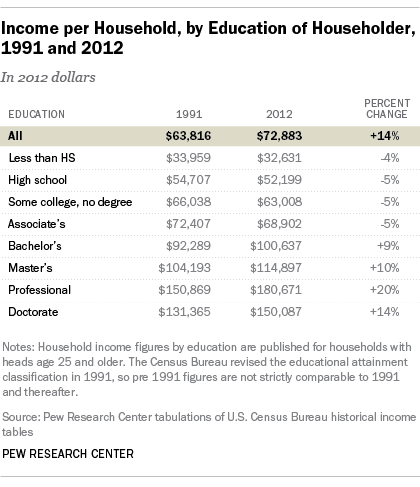This post originally appeared at Demos’ Policy Shop blog.
Pew had an interesting analysis earlier this week of the last 21 years of Census income data. In it, they break down the average incomes of households over this period sorted by educational attainment. The data reveals a clean cut along attainment lines. If you had a Bachelor’s degree or greater, your income, on average, went up in the last 21 years. If you had less education than that, your income fell.
This should serve as another reminder of a point I have been pressing for some time now: as popular as it is to obsess over the plight of college graduates, it’s really the non-graduates who bear the brunt of the economic pain. This holds at any given age level as well. If you think young college graduates have it bad, take a look at young non-graduates to see how bad it actually gets.
The increasing income divide between graduates and non-graduates will probably worsen our country’s already weak levels of social mobility. Research from Dynarsky-Bailey tells us that the percentage of low-income kids who complete college is 9 percent, while the percentage of high-income kids who do so is 54 percent. The divide in college completion among middle class groups moves up proportionately as well. Because parental income is such a strong factor in whether a kid enters and completes college, the growing divergence of income detailed in the above chart will likely just intensify class entrenchment. Graduates will make more and more money, boosting their kids chances of being a graduate, while non-graduates will make less and less money, boosting their kids chances of being non-graduates.
The milquetoast policy response to this observed phenomenon is to try to somehow sever the link between income and college completion rates. So you are supposed to try as best you can, even in the backdrop of severe income inequality, to push a few more poor kids through. It remains to be seen how effective that strategy can actually be. I am skeptical. But the saddest thing about that strategy is that it doesn’t deliver nearly what you would imagine. All things equal, squeezing a poor kid through college will probably increase their adult income. But it wont bring them anywhere near parity to their rich cohorts. As I reported earlier this year, a rich kid that completes college is 5x more likely to be in the top income quintile as an adult than a poor kid that does so. More troulbing still, a rich kid that doesn’t complete college is 2.5x more likely to be in the top income quintile as an adult than a poor kid that does.
Obviously on the policy side, you do what you can with what you have. But we face this intractable combination of problems right now: 1) increasing income inequality that diverges on educational lines, 2) a strong link between parental income and childhood educational attainment, and 3) a strong link between parental income and offspring income that even dominates over educational attainment. In the face of that cocktail of issues, it is really hard to see how anything short of altering the income distribution is supposed to deliver the goods.
 |
Matt Bruenig writes at Demos’ Policy Shop blog. His work has also appeared at The Atlantic, The American Prospect and Salon. |


